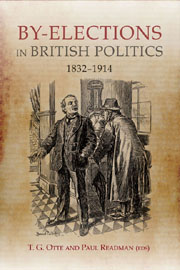Book contents
- Frontmatter
- Contents
- List of Figures and Tables
- List of Contributors
- Preface and Acknowledgements
- List of Abbreviations
- Introduction
- 1 ‘Plumping Contests’: The Impact of By-elections on English Voting Behaviour, 1790–1868
- 2 Government Appointment By-elections: 1832–86
- 3 ‘We should have had 1,000’: The By-elections of the 1874 Parliament
- 4 ‘The Glamour of Independence’: By-elections and Radicalism during the Liberal Meridian, 1869–83
- 5 ‘The Swing of the Pendulum at Home’: By-elections and Foreign Policy, 1865–1914
- 6 By-elections and the Modernisation of Party Organisation, 1867–1914
- 7 ‘A Terrific Outburst of Political Meteorology’: By-elections and the Unionist Electoral Ascendancy in Late-Victorian England
- 8 Land Reform and By-elections, 1885–1914: Do By-elections Matter?
- 9 Edwardian By-elections
- 10 Lloyd George, Limehouse and the Realignment of British Politics: The Bermondsey By-election of 1909
- 11 By-elections and the Peculiarities of Scottish Politics, 1832–1900
- Index of By-election Contests
- General Index
2 - Government Appointment By-elections: 1832–86
Published online by Cambridge University Press: 05 May 2013
- Frontmatter
- Contents
- List of Figures and Tables
- List of Contributors
- Preface and Acknowledgements
- List of Abbreviations
- Introduction
- 1 ‘Plumping Contests’: The Impact of By-elections on English Voting Behaviour, 1790–1868
- 2 Government Appointment By-elections: 1832–86
- 3 ‘We should have had 1,000’: The By-elections of the 1874 Parliament
- 4 ‘The Glamour of Independence’: By-elections and Radicalism during the Liberal Meridian, 1869–83
- 5 ‘The Swing of the Pendulum at Home’: By-elections and Foreign Policy, 1865–1914
- 6 By-elections and the Modernisation of Party Organisation, 1867–1914
- 7 ‘A Terrific Outburst of Political Meteorology’: By-elections and the Unionist Electoral Ascendancy in Late-Victorian England
- 8 Land Reform and By-elections, 1885–1914: Do By-elections Matter?
- 9 Edwardian By-elections
- 10 Lloyd George, Limehouse and the Realignment of British Politics: The Bermondsey By-election of 1909
- 11 By-elections and the Peculiarities of Scottish Politics, 1832–1900
- Index of By-election Contests
- General Index
Summary
Under the provisions of the 1707 Succession to the Crown Act and subsequent legislation MPs appointed to certain ministerial and legal offices were required to seek re-election on taking up office. Despite Lord John Russell's attempt to remove this necessity in his unsuccessful 1852 Reform Bill, it was not until 1919, with the passage of the Re-Election of Ministers Act, that this requirement was removed. The 504 government appointment re-elections which occurred between 1832 and 1886 made up the single largest category (27%) of all by-elections, or ‘single elections’ as they were frequently called, during this period. A slightly lower number of by-elections were occasioned by the resignation of a sitting MP, 489 in all, and another 449 by-elections were held on the death of an MP. The remaining 23% of by-elections were occasioned by MPs being unseated as the result of an election petition; succession or elevation to the peerage; an MP being elected for more than one constituency; or because of disqualification from the House of Commons.
This essay examines the 504 government appointment re-elections required of MPs taking up ministerial and legal office between 1832 and 1886. Of these ‘single elections’ 299 (59%) involved Whig, Reform or Liberal appointments and 205 (41%) were Conservative appointments: a result of the fact that Whigs and Liberals held office alone for over thirty-four years during this period, in coalition with Peelites for three years, and that the Conservatives were in government for seventeen years and six months. In particular, this essay considers those re-elections which were contested, to see what light they throw on the relations between government, party and the dynamics of local constituency politics.
- Type
- Chapter
- Information
- By-Elections in British Politics, 1832-1914 , pp. 51 - 76Publisher: Boydell & BrewerPrint publication year: 2013



